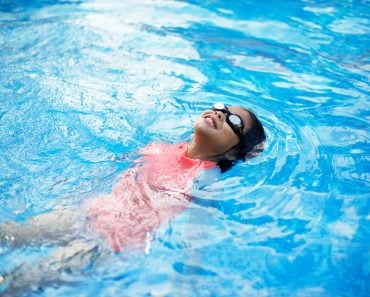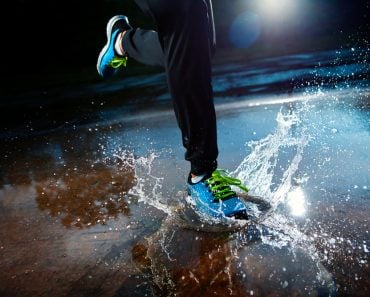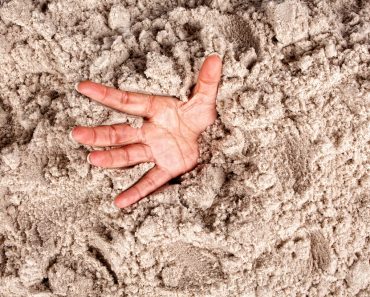Table of Contents (click to expand)
No, normal human beings cannot walk on water. The only way it can be done is by converting the water to a high density fluid or one with high viscosity. Also, if someone could run at 108 km/hr (30 m/s), then they would be able to run across water.
How many of us have tried to run into a swimming pool when we were kids, hoping to make it across without sinking? I’m pretty sure that many of us would have at least given it a try. I certainly did, but to my dismay, it only resulted in me splashing idiotically underwater just a few seconds later. The main reason I wanted to do this was one of the stories I’d heard growing up. One of the most famous Christian miracles involves Jesus Christ walking on water, proof of him having powerful spiritual abilities. Many mythical creatures are also believed to have this ability, but is it possible for normal human beings to perform such an extraordinary task?

Water, as you know, comprises nearly 70% of the total surface area of the Earth, which makes the oceans extremely important modes of travel. It would have been much easier for us if we could simply traverse the lengths of the seas and oceans without the help of boats, ships or any other kind of air transport. This is especially difficult because, as you know, we can’t stand upright on water without eventually sinking. However, the reason we sink whenever we try to walk on the surface is because the water is just not dense enough. That being said, there is an easy way that we can make the water dense enough. In order to understand how we would go about doing this, you first need to know the reason why we sink.
Recommended Video for you:
Why Do We Sink?
This might seem quite obvious if you believe that humans are simply too heavy to stand water, but I’m afraid it’s a little bit more complicated. The principle that determines whether a body can sink or not is called Archimedes’ Principle. It states that, for a body to float, it needs to displace the exact same amount of water with a weight equal to the total weight of the floating body. The weight of the displaced water exerts a force on the body, causing it to float. This force is called buoyant force and we can change its value by changing certain characteristics of water.
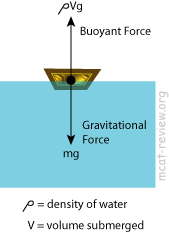
The condition for floating is quite simple: the buoyant force should be greater than or equal to the weight of the body. If the value of buoyant force is large enough, then a body floats; otherwise, it sinks. The only thing we need to worry about is how we can increase this buoyant force.
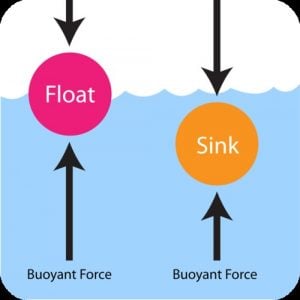
So… How Can We Walk On Water?
Method 1: Increase The Density Of Water
The amount of water displaced by the body is equal to the volume of the submerged part of the body. Therefore, if the density of water increases somehow, then the weight of the displaced volume of water also increases, which in turn increases the buoyant force, making it easier for the body to float. Water density depends on a number of factors:
1. The content of salt inside the water affects its density. The density of salt water is more than that of fresh water. Therefore, it is easier to float in the sea than a river.
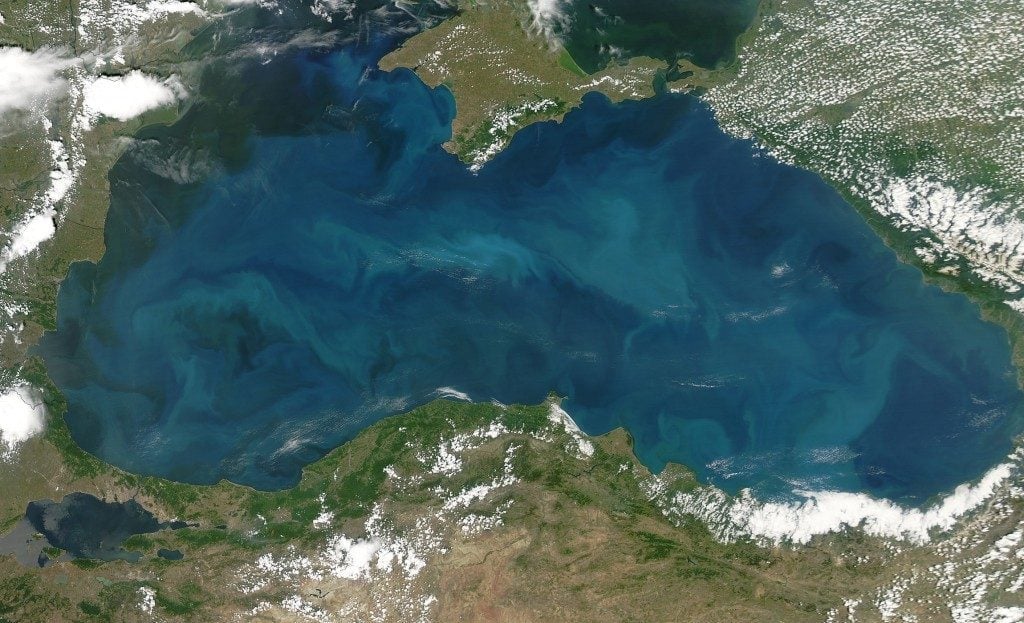
2. Density of water increases with a decrease in the temperature, so it is easier to float in colder water.
3. Increase the amount of water displaced by increasing the volume of the submerged body. This is why ships have a big hollow base – to give it more volume.
As you can see, these basic factors can be tweaked to increase the buoyant force experienced by a floating body, making it easier to stay afloat.
Method 2: Increase The Viscosity Of Water
When we ride a bike, the wind pushes against our bodies, slowing us down. This is due to the friction we experience from the air particles. Similarly, when we are underwater, we experience drag force. This quality of the fluid to resist force or inhibit motion is called the viscosity of the fluid. The viscosity of the fluid is directly proportional to the friction force that a moving body experiences. We can harness this feature of water to actually walk on water! But How?
If the viscosity is strong enough, the friction force exerted upwards by the fluid could actually stop us from sinking. This force, along with the buoyant force, can let us walk on water more easily.
One possible way to walk on water is to run extremely fast – much faster than humanly possible. We wouldn’t sink while running at high speeds because the friction force experienced due to water also depends on the relative speed at which the body is moving when it is underwater. The Science Channel says that Usain Bolt, the fastest man on Earth, has a speed that tops out at about 10.4 meters per second. To run on water, you’d have to zip over the top three times as fast – around 30 meters per second!
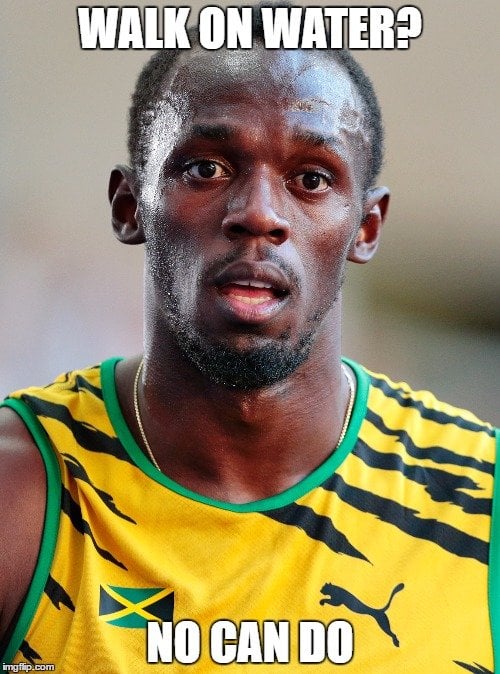
Method 3: Oobleck

The viscosity of a fluid is not a constant; it changes when the characteristics of a fluid are changed. Some fluids have enough viscosity to be able to support the weight of a human body under the right conditions. Oobleck is nothing but a mixture of corn starch in water and can easily be made inside your kitchen. What’s special about this is that it is a non-Newtonian fluid, which means that its viscosity increases if the pressure applied on it increases. Hence, the faster we move in this fluid, the harder it is to overcome the friction force. This property of Oobleck can easily be exploited if we move over its surface with enough speed. A person walking over it at a brisk pace can easily move through without any fear of sinking, due to the high amount of reaction force from the fluid. However, on the other hand, if a person doesn’t move quick enough, the Oobleck will swallow him like quicksand.
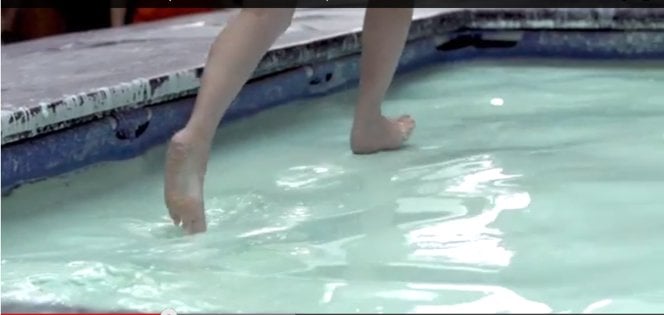
Technically speaking, walking over pure water isn’t possible. The only way it can be done is by converting it to a high density fluid or one with high viscosity. Also, if you think you can run at 108 km/hr (30 m/s), then you’ll have the ability to run across water. However, personally, I think that someone with that incredible ability would prefer the road!

